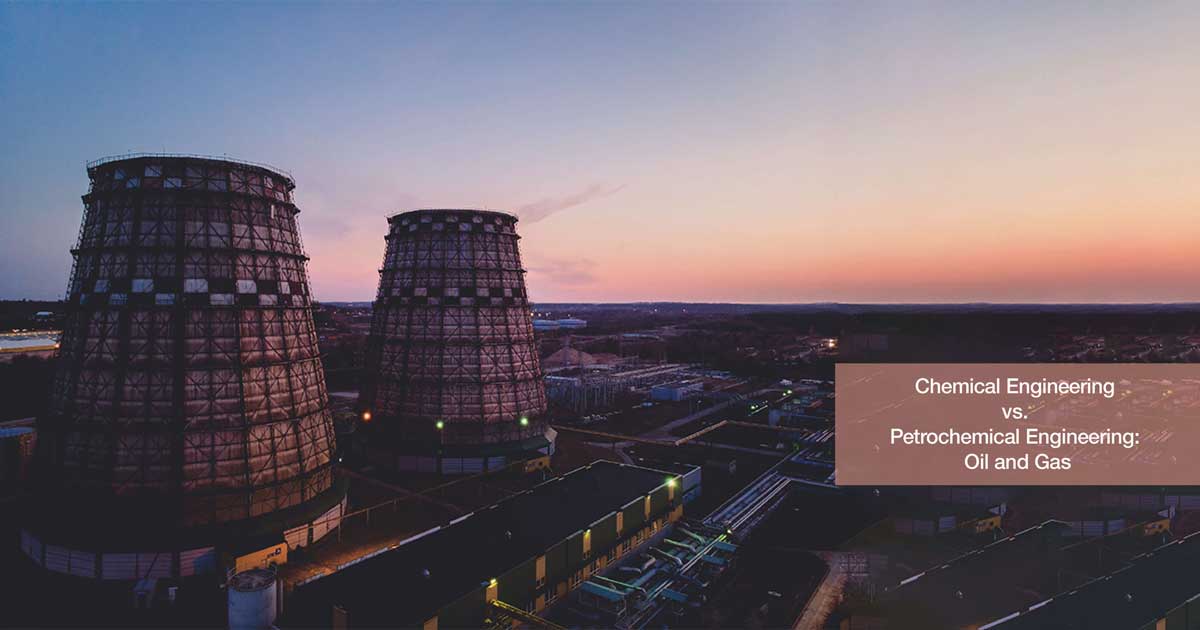FET Blogs


FET Blogs



20 May 2024
Table of Contents:
Chemical Engineering and Petrochemical Engineering are closely related fields that share fundamental principles but differ in focus and application. Both disciplines play crucial roles in processing and producing chemicals, fuels, and various industrial products.
Chemical engineering is a vast discipline that uses engineering concepts to design, develop, and operate processes and systems for large-scale production. Chemical engineers deal with various materials, such as chemicals, pharmaceutics, food, and materials. They emphasise a broad range of areas where chemical processes are involved, extending beyond the petrochemical industry.
Conversely, petrochemical engineering is a highly specialised branch of chemical engineering that focuses on the manufacturing and handling of petrochemicals. The extraction of crude oil, its refinement into useful products, and the subsequent processing of these products into numerous chemical derivatives are the areas in which petrochemical engineers specialise. It is primarily concerned with producing and processing chemicals from natural gas, petroleum, and their by-products.
The chemical engineering full-time undergraduate programme spans four years, usually about eight semesters. After completing the undergraduate degree, some students may pursue further education through master's or doctoral programmes, which can take an additional two to six years.
The petrochemical engineering undergraduate course is also a four-year commitment that teaches all about crude oil refinement, extracting crude oil using cutting-edge technology, heat transfer operation, and solid-fluid operations, among other things. Advanced degrees, such as master's or doctoral programmes, can add another two to six years of study.
Just like many other engineering disciplines, chemical engineering is also divided into practical, theory and assignments designed to provide a strong foundation in mathematics, physics, chemistry, and engineering principles. Students are taught how to link engineering to chemistry principles to take care of the production and use of chemicals efficiently. The programme acquaints students with a detailed study of different theories, operations and developments carried out in chemical plants, the equipment used in chemical engineering processes, and the management skills needed to be a successful engineer. Some subjects that are taught in chemical engineering include:
Petrochemical engineering, being a specialised branch of chemical engineering, focuses specifically on the processes involved in the production of petrochemicals. The curriculum includes core chemical engineering subjects but places a greater emphasis on topics related to petroleum refining, petrochemical production, and the utilisation of hydrocarbons. There are some specific areas of focus in petrochemical engineering, such as:
The primary responsibility of a chemical engineer is to design, conceive and troubleshoot processes for producing chemicals or fuels, conduct research, ensure safety compliance, design equipment, and monitor production processes. Job profiles suited for this degree are:
Development chemical engineers design, develop, and implement industrial processes that involve chemical reactions. They then make use of these processes for the creation of new products.
Materials engineers research the structure of atoms to design and develop innovative methods to apply in chemical procedures.
Analytical chemists gather, process and analyse data on various substances to learn about chemical pollutants and their reactive properties.
Mining engineers ensure safety while extracting gases, compounds and other elements from down the planet.
Energy managers perform audits to analyse the consumption of energy to ensure appropriate measures are taken to maximise energy conservation.
Since petrochemicals is a more specialised field, these engineers focus and work directly with transforming raw petroleum and natural gas into specific chemical compounds. Here are some lucrative career options for a petrochemical engineer:
Process engineers are responsible for designing and maintaining processes that include extraction and refining of petrochemicals.
Quality control engineers ensure that the products used in petrochemical production are safe and meet the safety standards and regulations. They manage and maintain the quality of the petrochemical elements.
R&D engineers work on studying and developing new processes, technologies and other products used in this industry.
Technical sales engineers offer support on product usage and application. They also provide technical expertise to businesses that use petrochemical products.
The oil and gas sector is ever-growing; therefore, extraction, refining, and processing of chemicals from these will not end. Both chemical engineering and petrochemical engineering are dynamic and essential fields that contribute significantly to industrial processes. Ultimately, the choice between the two depends on individual interests and career goals. Whether you're passionate about designing chemical processes in a broad sense or specialising in the petrochemical industry, both fields offer exciting opportunities for exploration and innovation.
A1: Petroleum engineering is best for oil and gas industry careers.
A2: Petrochemical engineers in India earn 5-12 lakhs per annum initially.
A3: Petrochemical engineering focuses on petroleum products, while chemical covers broader processes.
A4: Petrochemical engineering’s future lies in sustainable fuels and green processes.
A5: Pharmaceuticals and energy are top sectors for chemical engineers.
Popular Post
17 February 2026
AIE Full Form
10 February 2026
AEIE Full Form
22 January 2026
AE Full Form
16 January 2026
What is Aerospace Engineering?
16 January 2026
What is Chemical Engineering?
Ask an Expert for Free